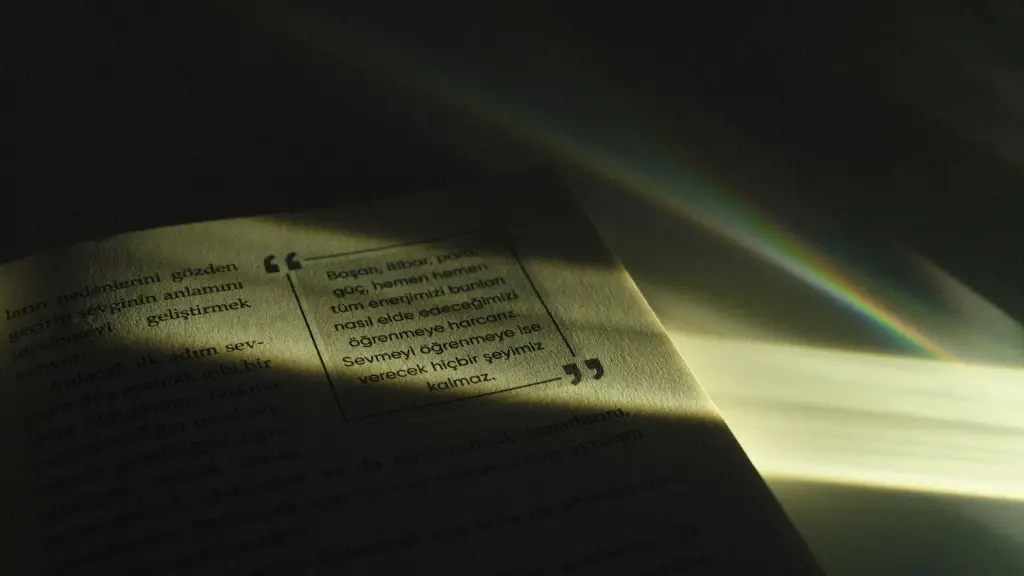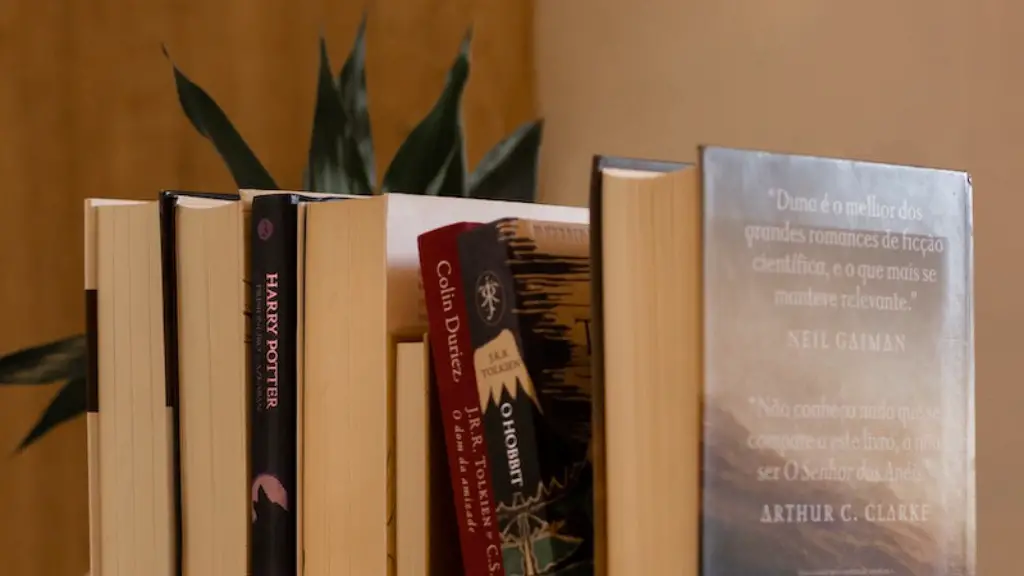For centuries, poetry has served as a form of expression for both individuals and cultures alike. Poetry has been used to express emotions, capture stories, celebrate people and moments, as well as pass down values and traditions. While poetry has been a foundation of literature for hundreds of years, it continues to be taught in school today. Today, poetry is used to provide students with an outlet to explore their creative sides, learn more about the English language, communicate complex ideas in streamlined messages, and develop an appreciation for the written word.
Poetry teaches students to look beyond the surface of words and their meaning, which can help them develop a better understanding of literature. By studying poetry, students learn to recognize the various techniques used to create emphasis, imagery, and emotion. These types of literary devices are essential for deciphering dense pieces of literature as well as in forming an understanding of context. Poetry is also a great way for students to develop an understanding of language, structure, and meter. The rhythmic beat of well-constructed poems can be appreciated by readers of any age.
Poetry can also be used as a way to provide students with an alternative way to express their thoughts and feelings. Writing poems can be an effective way for students to articulate their thoughts and feelings in ways that prose might not allow. It can also be used as a tool to explore how different authors express similar messages in different ways. Last but not least, poetry can also provide students with an opportunity to be creative. Most poems allow for a level of freedom that is difficult to achieve when writing an essay. Students are encouraged to use their imaginations to create pieces of literature that are unique and engaging.
While it is true that not all students will respond positively to the use of poetry in the classroom, there are many benefits to having poetry as part of a student’s education. From learning linguistic and literary techniques to exploring alternative forms of personal expression, reading and writing poetry is a valuable experience for anyone. Poetry should not be thought of as a chore, but instead, an opportunity to broaden one’s understanding of the world as well as develop a greater appreciation for literature.
What Poetry does for the Human Condition
Poetry has long been used as an expression of the human condition, and it has been through poetry that one can find understanding and respite during difficult times. Because the writing of poetry can often be an emotionally charged experience, it can be a powerful healing mechanism for people of all ages. Through the construction of imagery and metaphor, poets can convey deeply personal experiences in ways that can provide comfort to readers. In this way, poetry can offer some deeper insight into the human experience that is often difficult to achieve in other forms of writing.
If we are to nurture the positive emotions and experiences in our world, we must start with teaching the importance of poetry. Poetry can be an effective way to spark dialogue about various topics, such as cultural differences, historical events, emotions, and more. Through the use of poetry, we can create a more accepting atmosphere with an understanding of different points of view. As a result, it is essential for students to be exposed to various forms of poetry in order to gain an appreciation for its importance.
Poetry can also offer an escape from the mundane aspects of life, as reading poetry can be a calming and therapeutic experience. Because of its lyrical nature, poetry can be used as a form of meditation, helping to provide clarity and perspective. For many, poetry is a means of self-expression and connection to their innermost feelings. Poetry can help individuals tap into their emotions in meaningful ways and express them on the page.
Additionally, poetry can create a bridge to understanding others, as well as to different cultures and backgrounds. Expressing oneself in words can help to eliminate barriers between people and encourage communication. By understanding the art of poetic expression, students can develop an appreciation for cultures and learn more about the people behind the poetry.
The Power of Poetry in Education
It is important to recognize the power of poetry in education and its ability to expand the boundaries of student understanding. Teaching poetry in school can do more than just teach language and literary techniques. Through poetry, students can learn to feel and empathize with others, develop an understanding of different perspectives, gain insight into various cultures and backgrounds, and, most importantly, learn to express themselves. Therefore, poetry should be seen as an essential part of any education, as it can offer students a means of not only communication but of exploration and understanding, as well.
The power of poetry in education has been increasingly recognized, as more and more schools are integrated the craft of writing into the classroom. In recent years, schools have started introducing elements of spoken-word poetry and performance poetry in classrooms as a way to engage their students and offer them an alternative way to express themselves. Such programs, if properly introduced, can help to create an atmosphere of acceptance and understanding within a community, and can ultimately lead to the development of more meaningful relationships.
In addition, these efforts can help encourage students to read and write poetry, which can help to create a more literate society. Poetry helps to encourage students to think outside the box and can provide a platform to explore complex issues in simpler terms. Teaching students to appreciate the beauty and tactfulness of poetic language can be an invaluable learning experience.
For these reasons, poetry should be an integral part of any education. Not only does it offer students the opportunity to broaden their vocabulary, it also helps to create a more accepting and understanding environment. Poetry is a powerful and enriching form of communication and should be celebrated as such.
What We Can Learn from Poetry
Throughout the years, poetry has served as a powerful tool for self-expression and as a unique form of communication. Poetry can be used as a way to capture the beauty of life and to explore the complexities of relationships. By studying poetry, we can gain a greater understanding of the nuances of language, as well as its capacities for masking and expression.
Additionally, by studying poetry, readers can learn to recognize the emotional undertones in words, as well as the impact that different pieces of literature can have on us as individuals. Through poetry, readers can explore a range of different emotions, including joy, sadness, anger, and more. Poetry can be used to evoke powerful moments of understanding, which can help to cultivate a more empathetic society.
Furthermore, poetry can also be a great tool for personal growth. Writing poetry can be a method of self-reflection, allowing individuals to express their innermost feelings in ways that writing a diary may not allow. Through poetry, individuals can explore their goals, fears, dreams, and aspirations in ways that can help to guide them on their path to personal development.
The beauty of poetry lies in its many forms and interpretations. As such, poetry can be seen as an invaluable source of knowledge, offering readers insight into different life experiences and perspectives. By studying and appreciating poetry, readers can gain a greater understanding of the written word and the art of communication.
The Value of Poetry
All in all, the value of poetry cannot be underestimated. Poetry provides readers with an opportunity to explore their creativity as well as their emotions. It is an effective tool for self-expression and can be an important part of any education. By studying and writing poetry, students can access a greater understanding of language and literature, as well as a more empathetic worldview.
If we are to grow our society, we must begin by educating our students on the power of poetry. Poetry has been a foundation of literature for centuries and continues to play a prominent role in culture, education, and life. It has the power to evoke understanding, ignite emotion, and explore the complexities of the human experience.
Poetry is a unique form of expression and communication, and it is essential for students to be exposed to various forms of it in order to understand its importance and relevance. By doing so, students can develop an appreciation for the written word and discover the beauty of language.
Ultimately, poetry is an integral part of any education, as it can offer students the opportunity to think more deeply, explore emotions, and understand various perspectives. It is essential for the development of meaningful relationships and the growth of society as a whole.





